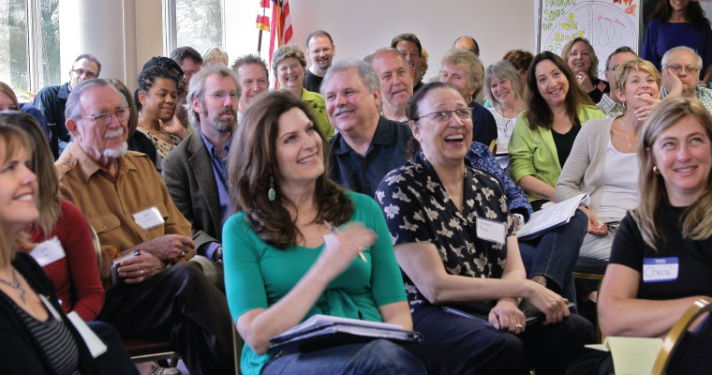
From the moment she stepped into the room, Shannon McQuillan’s hunch, based on the cramming she’d done to prepare for this event, was confirmed – these next few days were not going to be the professional development fare she was used to.
“I remember coming into a room where there were just groups of four chairs facing each other – no tables – so you knew you would be in close proximity to all these people,” Shannon says.
Sure enough, small-group conversations started right off the hop.
One of those discussions further underscored this event would be unique.
A delegate from Alaska shared that for her 50th birthday she had arranged for a similar type of gathering as a gift to her community.
“It was another moment of ‘wow,’ ” says Shannon, adding she felt like a real “lightweight” in that gathering of change agents and social entrepreneurs from around the world.
“I was just taking in all of these people who had been working some of these concepts, and it was really kind of mind-bending, to see all this work that was being done with some of these philosophies that I just had no clue about.
“From the get-go, I was like ‘Holy moly this is a different way of looking things; I think this is going to be a different way of looking at everything.’ ”
Peter Block, John McKnight, Walter Brueggemann and Peter Koestenbaum were the hosts for the spring 2012 Connecting for Community gathering in Cincinnati Shannon was attending.
A simple program filled the three days, including music, listening to presentations from the four hosts and conversation in small groups – and repeat.
But Shannon describes herself as exhausted and confused by the end.
The exhaustion was in large part from trying to make sense of these different concepts and ways of seeing the world, she says. “I just remember (John in particular) turning things up-side-down.”
The confusing part was “being able to see with fresh eyes, but not knowing what to do next or how to operationalize what I had learned,”
she adds.
|
The referenced media source is missing and needs to be re-embedded.
|
|
| John McKnight, creator of asset-based community development and author of A Careless Society, has joined Peter Block in practical explorations of how communities become “villages” with the capacity to raise their children. Photo: Harriet Kaufman. |
“I appreciated this new perspective but needed to go away and wrestle with it before I could really make different choices.”
Luckily, Shannon says, she had several opportunities in the weeks following Cincinnati to synthesize her experience and share it with a number of different audiences.
There she found herself focussing on citizenship and how the obsession with leadership in our society “takes us all off the hook.” “We look to others to solve our problems and fix our communities and organizations as opposed to coming together as citizens and designing a way forward together,” Shannon says, echoing insights she heard in the gathering.
With that old paradigm dismantled, the Kamloops, B.C. resident says, she’s been working with more of a citizenship orientation, especially in her people development role with the Western Canada engineering company Urban Systems Ltd., a team of about 300.
Having a citizenship orientation in the workplace, she says, means emphasizing how “we all, together, are going to effect change” as opposed to, “who’s the leader that will create a plan for everyone to follow.”
Trust is critical for this to work, as is collective rather than lone ranger citizenship, the latter of which is a bit of a paradox anyhow, Shannon says.
There can be messiness with this approach, “but I would rather have that than people just being resentful that things aren’t happening”
“We can deal with messiness if we’re just transparent about it.”
Shannon says she’s excited by the idea of people being truly engaged “citizens” at Urban.
“We’re a community here at Urban Systems.
“And for people to really feel like they can make a difference, regardless of how long they’ve been here, or what they do here, whether they’re a partner or a non-partner, just for them (to be
clear) that, ‘I am a citizen, I have a voice, I can make something happen here’ would be the ultimate.”
Citizenship and leadership, as they can be typically understood, tend to operate at one another’s expense, with leadership generally given the greater weight, she adds. The ideal would be to see them on more of on an even keel.
As team members turn themselves into active citizens there’s less pressure on leadership. Rather than seeking out the next hero leader, the focus is on shared leadership with responsibilities distributed according to people’s strengths and skills.
Words like “more powerful” and “stronger” come up as she tries to describe what the team and its work would look like if there was active workplace citizenship.
To learn more about the next Connecting for Community event, slated for April 24-26, click here.
You can comment on this story below, or by e-mailing michelle(at)axiomnews.ca.





